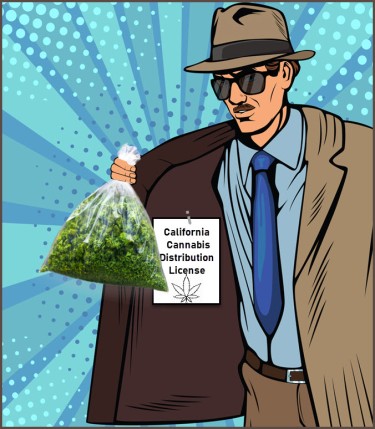
According to a lawsuit reported by Green Market Report, Glass House Brands Inc., operating under the name Catalyst, a California cannabis company based in Long Beach, has been accused of unlawfully transporting and shipping cannabis across state lines on airplanes.
On June 6, Catalyst filed a lawsuit against Glass House in Los Angeles County Superior Court, alleging that Glass House is profiting from the illegal cannabis market in California, undermining the legal market and businesses that adhere to regulations. The lawsuit asserts that Glass House is potentially one of the biggest black market operators of cannabis in California, if not the entire country.
What Transpired
According to the lawsuit, Glass House is accused of utilizing a combination of legal and illegal distributors to distribute cannabis nationwide. The company allegedly collaborated with businesses that employ a strategy known as "burner distros." This practice typically involves legal cannabis operators acquiring distribution licenses in various local jurisdictions, particularly in areas with abundant cultivation operations or where licenses are easily obtained.
To execute this strategy, Glass House allegedly employs a network of individuals who agree to have their names associated with these licenses. Once the licenses are obtained, these "burner distros" purchase significant quantities of cannabis from in-state cultivators who, in turn, turn a blind eye to keep the surplus cultivation tax revenue flowing. The lawsuit claims that these burner distros have been supplying legally produced cannabis to the black market throughout the country.
The lawsuit claims that Glass House Brands (GHB) actively supports the thriving black market by specifically choosing to work with Burner Distros and similar entities to distribute its cannabis illegally. By doing so, GHB avoids paying taxes and can sell its "excess capacity" that would otherwise impact the legal market's cannabis prices. The suit alleges that GHB has profited significantly by selling illegal cannabis at high-profit margins.
Additionally, the lawsuit suggests that GHB's substantial increase in net cannabis sales during the fourth quarter, amounting to a 75% year-over-year growth, can be attributed to both illicit marijuana sales and the establishment of a massive 5.5 million square foot greenhouse facility in Southern California.
As GMR reported, "Selling into the underground market, the suit alleges, is the only viable way that Glass House could justify opening a 5.5 million-square-foot cultivation facility last year, with plans to ramp up production by 62% this year."
Basically, by using some back of the napkin math and some supply and demand numbers, you can figure out that with that amount of cannabis being produced at that large location, some of it had to go into the illicit market, most likely through burner distros.
The plaintiff Catalyst aims to address and curb GHB's alleged "illegal, fraudulent, and unfair business practices" through this lawsuit.
Selling into the underground market, the suit alleges, is the only viable way that Glass House could justify opening a 5.5 million-square-foot cultivation facility last year, with plans to ramp up production by 62% this year.
According to the lawsuit, Glass House Brands (GHB) has implemented a dual-channel structure described as a significant "win-win" situation for GHB but a substantial loss for Catalyst and other lawful operators. The legal operators suffer from lost sales to illegal dispensaries while still being obligated to pay the required taxes, unlike the black market transactions facilitated by GHB, which evade such taxes.
Regulatory Measures Target California's Underground Cannabis Market.
A recent report released by the California Department of Cannabis Control (DCC) highlights enhanced enforcement actions taken against illegal marijuana operations in the state over the past two years.
According to David Hafner, the DCC spokesperson, their focus in 2022 was primarily on targeting illicit cultivation efforts, which yield a significant amount of illegal cannabis compared to dispensaries. Hafner emphasized the safety risks of these illicit operations, as armed and dangerous criminal organizations often orchestrate them.
To promote greater access to cannabis products in underserved areas and prioritize social equity initiatives, the agency has initiated a $20 million grant program called the Local Jurisdiction Retail Access Grant. This program aims to assist local jurisdictions in expanding their cannabis retail programs statewide, particularly in areas lacking adequate services.
$20 Million Grant Program
The Department of Cannabis Control (DCC) is introducing the Local Jurisdiction Retail Access Grant, the nation's first program. This grant program aims to provide local jurisdictions with resources to expand access to regulated cannabis products in underserved areas. Priority will be given to areas where national surveys indicate high cannabis consumption but limited or no access to legal cannabis retail. The grant program encourages adopting local best practices, particularly those supporting equity operators and utilizing existing licensing and permitting procedures.
The lack of access to California's legal cannabis market poses risks to consumer safety and perpetuates the existence of the illegal market. By offering financial support to establish pathways for retail licensing and providing incentives for ensuring consumers have access to legal retail, these grant funds aim to reduce illicit market activities. The ultimate goal is to enable consumers to access legal retail stores and regulated cannabis products, promoting a safer and more regulated marketplace.
According to DCC Director Nicole Elliott, expanding access to California's retail cannabis market is crucial for safeguarding consumer safety and fostering a well-balanced marketplace. The retail access grant program aims to promote the establishment of legal retail operations in areas where existing consumers lack convenient access to regulated cannabis.
This groundbreaking initiative marks the first time a state has offered grants to facilitate local government-level access to retail cannabis licensing. With more than 60% of California jurisdictions currently not providing local retail licensing for cannabis, the retail access grant program can provide essential support to cities and counties, enabling them to collaborate with the state and ensure consumers have adequate access to regulated cannabis.
The $20 million grant program will distribute an initial $10 million in grants by June 20, 2023. An additional $10 million will be made available to previous grant recipients as they issue licenses.
Conclusion
In a groundbreaking move, California is taking regulatory action to address its illicit cannabis market. As revealed in a lawsuit reported by Green Market Report, Glass House Brands Inc., operating as Catalyst, has been accused of transporting cannabis across state lines on airplanes in violation of regulations. Glass House is alleged to be one of the largest black market operators of cannabis in California and possibly the entire country.
To combat the underground cannabis market, the California Department of Cannabis Control (DCC) has been enhancing enforcement efforts, particularly targeting illicit cultivation. Overall, California's proactive approach towards regulating its cannabis market underscores the importance of consumer safety and establishing a balanced marketplace. Through collaborative efforts and financial support, the state aims to diminish the illegal market's influence and ensure that consumers have reliable access to legal retail stores and regulated cannabis products.






